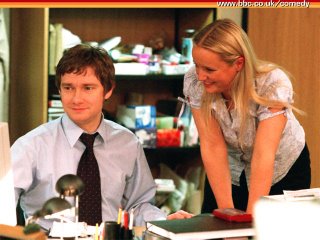The first in an occasional series where I babble about the TV shows I like.
The first season of the American edition was pretty grim. It certainly had the excrutiating discomfort of the British version, but it wasn't very funny. I also found Michael Scott grating and shrill. Ricky Gervais had played the character as socially desperate, too, but I had more sympathy for David Brent.
At any rate, the second season, somehow, turned everything in the right direction. Like the British show, it found absurdity and sadness in the relationships that dominate our lives: the ones we have by coincidence rather than choice. Every episode in the second season was astonishingly funny. The supporting and background cast got fleshed out, too; even though the show has its stars it also has a vivid ensemble. In a recent Fresh Air interview, Mindy Kaling articulated something very nicely. Even if the characters are awkward-seeming, we always also know that they have lives outside of their jobs; we see that someone loves them, and that they love someone themselves. Nobody in this show is reduced to a gimmick, catchphrase or type.
The third American season so far is quite good, though there have been a couple digressions into wackiness that seem too contrived (generally involving Dwight). The Jim-Pam-Roy (and possibly Karen, now) love stories (not to mention the Ryan & Kelly one) are all resonant, though.
One of of the best choices the show has made in its third season has been to solicit the audience's sympathy for Roy. The most salient critique one could make of the British show was that, in the end, Lee became too one-dimensionally loutish for us to believe Dawn would stay with him (in the episodes prior to the Christmas Special, we did get glimpses of what Dawn saw in Lee). In the American season three, Roy is actually very sweet, and also downright handsome (following the low point for him in terms of personal appearance: his DUI mugshot). As much as we like Jim, it's hard to not root for a guy who so earnestly talks about wanting to atone for taking Pam for granted.

Expanding Jim's horizons has been a good idea, too. I have a good friend at school who liked the British show a lot, but had no sympathy at all for Tim or Dawn. Her point was that Tim and Dawn each know they are miserable, and neither do anything about it. You can argue that Tim tried to do something about his infatuation with Dawn, and was turned down twice, but that initiative didn't extend to the malaise he felt in every other aspect of his life. Dawn was a bit more complicated (and, I think, more sympathetic for being so). She recognized that she was wasting her time and talent as a receptionist. Lee discouraged her from pursuing illustrative work (riskier in terms of income and longevity), and her acquiescence is either pragmatic or defeatist.

Jim and Pam weren't as resigned to their fates as Dawn and Tim. Perhaps we can read something of the American mythology into the Jim-Pam / Tim-Dawn contrast, but separating them and resolving the wedding in the off-season was probably also necessary to sustain the narrative. Their efforts at bootstrapping (Pam's calling off the wedding and moving out on her own, and Jim's seeking a promotion to a busier branch) has also thrown into doubt the notion that they should or will even be together. Are they still right for each other if they don't see each other every day? Is their attraction any less romantic for being replicable in another office, with another person? Is Jim's loneliness for Pam (and vice versa) any less affecting if he also has a new office companion to flirt with? Probably this will all wrap up fairly cleanly, but it's pretty awesome that a sit-com can orchestrate emotions messy enough to resemble the real world.

No comments:
Post a Comment